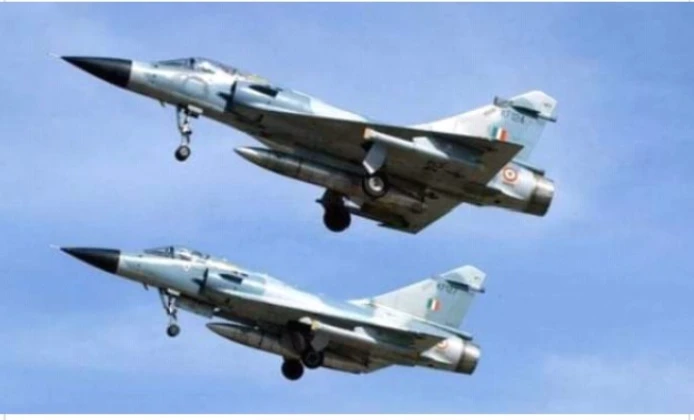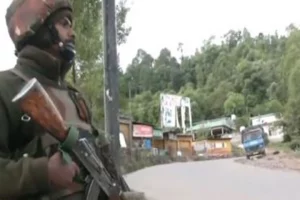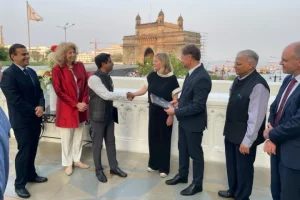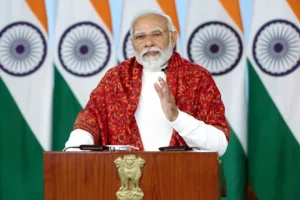The killing of 5 soldiers in a high precision terror attack in the Kandi Forest area, parallel to the Pakistani Foreign Minister Bilawal Bhutto Zardari’s participation at the Shanghai Cooperation Organisation (SCO) summit in Goa, has come with an outdated message from Rawalpindi: That talks and terror with India could go together.
And with that Islamabad is playing with fire, provoking India to assert itself at its time of choosing.
There is context to the Kandi Forest incident. In Goa India went along with the formality of hosting Pakistani foreign minister Bilawal Bhutto Zardari who had arrived to participate in a meeting of the top diplomats of the 8-nation Shanghai Cooperation Organisation (SCO).
But alongside the participation at the SCO in Goa—the first visit to India by a Pakistani FM—Islamabad left no stone unturned to fail the scheduled G20 summit event in Srinagar. It issued a statement, raising objections to the first major international event in Kashmir after 1987. A senior Pakistani Army officer threatened to take the battle into the Indian territories “in case of any adventurism by India”.
Two major terror attacks have been executed in Jammu and Kashmir till date after some guerrilla groups threatened to fail the G20 events with “very big strikes”. As many as 10 soldiers were killed, 5 each in the attacks in Bhimber Galli of Poonch and Kandi Rajouri on 20 April and 5 May respectively.
With Friday’s fatal casualties, as many as 24 Indian Army soldiers have been killed in 5 terror strikes in Jammu’s border belt of Poonch-Rajouri—5 at Chamrer forest near Surankote Poonch on 11 October 2021; 4 at Bhatti Durian in Bhimber Gali Poonch on 14 October 2022; 5 in a fidayeen attack at an Army camp in Pargal Rajouri on 11 August 2022; 5 at Bhatti Durrian in Bhimber Gali Poonch on 20 April 2023; and 5 at Kandi, Rajouri, on 5 May 2023.
Apart from attack on troops terrorists also killed one civilian in an IED blast near Rajouri in April 2022, 2 labourers near an Army camp in Rajouri on 16 December 2022 and 7 children in twin terror strikes on 1 January 2023 at Dhangri, Rajouri.
This fresh trail of blood is unmistakably a statement not only after the abrogation of Article 370 in August 2019 but also in the aftermath of the Indian surgical strikes inside PoK in September 2016 and at Balakote, Khyber Pakhtunkhwa, in February 2019. The Indian Air Force (IAF) strike on a terror training camp at Balakote created a verifiable deterrence against major terror attacks inside Jammu and Kashmir. It was for the first time brought home to Islamabad that New Delhi would not hesitate to cross the border in case of a retake of the Pulwama-like strike.
For over two years, there were no major terror strikes. The security forces and the Jammu and Kashmir continued a remarkable counterinsurgent drive and brought the militancy down to its lowest ebb—almost to the lowest ever mark of 2013.
But with the two recent attacks, in which 10 soldiers got killed, have apparently an added context of the G20 summit event. These came days before the world leaders and diplomatic representatives would assemble for a Tourism Working Group meeting at SKICC Srinagar on 22-24 May. The idea, like always in the past, is to create big news and attract the world’s attention to the ‘political problem’ in Kashmir.
If the top rungs of the security and intelligence establishment are to be believed, the handlers of the Kashmir insurgency, without regard to the political executive in Pakistan, are making all possible attempts to sabotage the G20 event in Kashmir. One or two more Rajouri-type attacks cannot be ruled out in the next 18 days.
According to the men in the top echelons of the BJP government, India could retaliate ‘fiercely’ and seek to create a fresh deterrence if the terrorists, operating under different front names, succeeded to execute a ‘big bloodshed’. “Thereafter, the enemy would think twice before planning even a minor terror attack”, said a well-placed official source.
It is not that Pakistan has not been forewarned. In Goa, External Affairs Minister S. Jaishankar was emphatic in bluntly pointing out that, “They (Pakistan) are committing acts of terrorism. I don’t want to jump the gun on what happened today, but we all feel equally outraged. On this matter, the terrorism matter, I would say that Pakistan’s credibility is depleting faster than even its Forex reserves,” Jaishankar said.
#WATCH | On Pakistan Foreign Minister Bilawal Bhutto Zardari’s arrival in India, EAM Dr S Jaishankar says, “He came here as the Foreign Minister of an SCO Member State. That is part of multilateral diplomacy. Don’t see it as anything more than that. I think that nothing from what… pic.twitter.com/9vEIVw3iKS
— ANI (@ANI) May 5, 2023
He further added that Pakistan has nothing to do with G20 and Srinagar.
“I said they (Pakistan) have nothing to do with G20. I will also say that they have nothing to do with Srinagar. There is only one issue to discuss on Kashmir which is when does Pakistan vacate its illegal occupation of Pakistan Occupied Kashmir,” the EAM added.
On a question on abrogation of Article 370, EAM Dr S Jaishankar phrased, “…wake up and smell the coffee. 370 is history. The sooner people realise it, the better it is.”
It is time that Pakistan read the tea leaves right and not provoke a painful retaliation from India.
Also Read: Pakistan credibility is depleting faster than its forex reserve: EAM slams Pak FM Bhutto in Goa




















